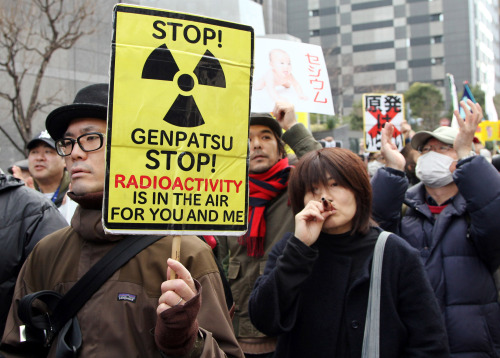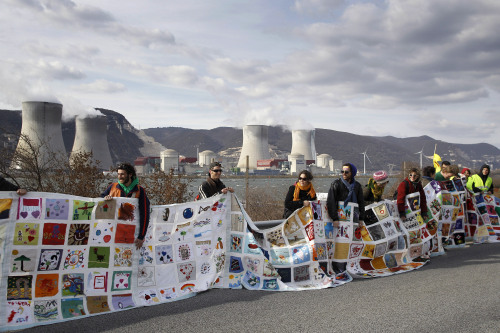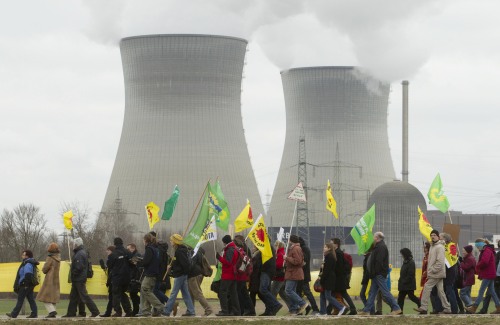
In Japan, tens of thousands rallied near the crippled plant, demanding an end to nuclear power as the nation held memorial ceremonies for a disaster that claimed almost 20,000 lives.
The tsunami swamped cooling systems at Fukushima and sent three reactors into meltdown, spewing radiation into the environment.
Around 16,000 people gathered at a baseball stadium in Koriyama, some 60 kilometres (40 miles) from the plant.
Participants called for an end to nuclear energy in Japan and compensation for victims from operator Tokyo Electric Power.
“Our town has turned out to be another Chernobyl,” Masami Yoshizawa, who ran a cattle farm in Namie, 10 kilometres (six miles) from the plant, shouted through a loudspeaker. “We are in despair now, but I will get back my hometown even if it takes me the rest of my life.”

Demonstrators in France’s Rhone valley formed a human chain that organizers said stretched for 230 kilometres (140 miles) and consisted of about 60,000 people. The region has Europe’s highest concentration of nuclear reactors, demonstrators said.
France’s 58 nuclear reactors generate about 75 percent of the country’s electricity, making it the world’s most nuclear-dependent nation.
Activists across Germany carried out similar protests, with organizers claiming as many as 50,000 people turned out across the country.
Following the Fukushima disaster, Berlin said it would immediately switch off Germany’s eight oldest reactors and close nine others by 2022.
Demonstrators, who formed a chain around the nuclear power station in Brokdorf in northern Germany, want the government to quicken that timeline.

Hundreds of anti-nuclear demonstrators converged on the Australian headquarters of global mining giants BHP Billiton and Rio Tinto, calling for an end to uranium mining in Australia.
Organiser Kazuyo Preston said Rio and BHP had both supplied uranium to Fukushima from their Australian mines.
Australia does not use nuclear power but is the world’s third-ranking uranium producer behind Kazakhstan and Canada, exporting 9,600 tonnes of oxide concentrate worth more than Aus$1.1 billion (US$1.2 billion) a year.
In the Taiwanese capital Taipei, a crowd of thousands observed a one-minute silence and called on the government to shut down the island’s three nuclear plants that generate about 20 percent of its power.
Spanish demonstrators demanded the closure of a nuclear plant in Garona.
The reactor in northern Spain is similar in design to Fukushima and has been running since 1971, making it the oldest of Spain’s eight reactors.
Around 5,000 anti-nuclear demonstrators in Switzerland called for the immediate closure of two of the country’s power stations. (AFP)


![[Weekender] Geeks have never been so chic in Korea](http://res.heraldm.com/phpwas/restmb_idxmake.php?idx=644&simg=/content/image/2024/05/16/20240516050845_0.jpg&u=)


![[News Focus] Mystery deepens after hundreds of cat deaths in S. Korea](http://res.heraldm.com/phpwas/restmb_idxmake.php?idx=644&simg=/content/image/2024/05/17/20240517050800_0.jpg&u=)

![[KH Explains] Why Korea's so tough on short selling](http://res.heraldm.com/phpwas/restmb_idxmake.php?idx=644&simg=/content/image/2024/05/19/20240519050115_0.jpg&u=20240519162247)

![[Herald Interview] Byun Yo-han's 'unlikable' character is result of calculated acting](http://res.heraldm.com/phpwas/restmb_idxmake.php?idx=644&simg=/content/image/2024/05/16/20240516050855_0.jpg&u=)








